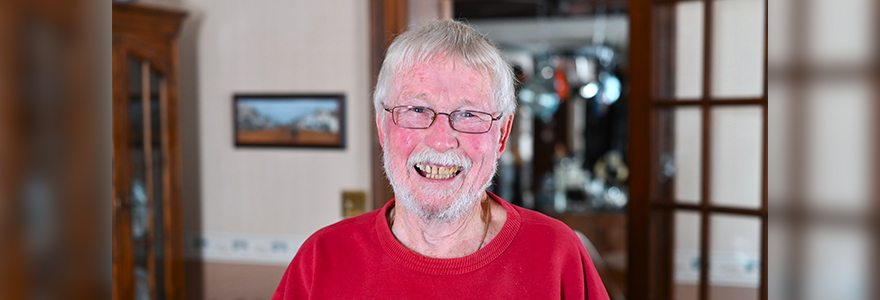
Western University alum and Faculty of Education supporter Bill McHugh.

Western University alum and Faculty of Education supporter Bill McHugh.
Bill McHugh still remembers the light bulb moment that sparked a lifelong passion for teaching.
He was in the midst of what he describes as “the best year of my university experience.”
His best year wouldn’t come until after he obtained a Bachelor of Arts degree from Western University, a program he switched into after he “found out the hard way” that engineering wasn’t for him.
McHugh had planned for a master’s degree, but instead landed a job at the General Motors Diesel manufacturing plant in London, Ont.
But to McHugh, it was just a job.
He wondered whether he should pursue a career path related to his interest in the arts, a question he would bring up to friends from Western who had since become teachers.
One of them allowed McHugh to sit in on one of their classes, granting him a front row seat to a history seminar at Clarke Road Secondary School in east London.
The light bulb hadn’t gone off yet, but McHugh’s interest was piqued. His intuition fixed his eyes on Althouse College, the teacher training institution that would later become Western’s Faculty of Education.
McHugh handed in his resignation letter to GM Diesel and was enrolled with the Class of ’67 soon after.
McHugh’s path to Althouse was a common one at the time.
Out of his 25 classmates, McHugh said only a handful had come to the program directly from their undergraduate studies. The rest came from the work force.
“We were challenged,” McHugh said.
“And the guy who did the challenging was a fellow named Geoff Milburn”
Milburn, a Professor Emeritus who worked at the Faculty of Education until his retirement in the 1990s, was delivering a course on how to teach history.
“At a time when history was being shovelled to students in a process of regurgitation, Geoff Milburn’s approach was, ‘they don’t need the facts, they need the skills, so what we do here is we develop the skills by using history as the vehicle,’” McHugh said.
“And all of a sudden, the light went on. It wasn’t just my light; it was the light of everybody in our class.”
What followed, McHugh said, were impassioned discussions around a lunch table with his classmates about the lesson they just received. Before McHugh knew it, their hour-and-a-half-long break was over, and the future teachers were on to their next class.
“It was so enjoyable because for the first time, I was being stimulated and I was being asked to use my artistic bent to develop things that could be used in the classroom,” he added.
“I was hooked.”
“If I had to do it over again, I would do it exactly the same way,” McHugh said.
“I enjoyed going to school every day of my life.”
McHugh’s enjoyment came from tackling the challenge of devising a plan to deliver lessons and programs to students in a way that would allow them to acquire new skills or develop more fully the skills that they already had.
“I became like a hockey coach and developed a playbook,” McHugh said.
“I had this great big, thick binder for teaching history complete with a topic and various things that I might try.”
Throughout his 30 years of teaching, McHugh taught a variety of subjects, beginning with history and geography, then English, followed by family studies toward the end of his career.
He would cross paths again with the Faculty of Education, this time in the form of delivering The Fourth R, an educational program built on the principle that relationship skills can and should be taught in our schools in much the same way as the other three R’s of education — reading, writing and arithmetic.
McHugh was hired by Ray Hughes, a former teaching colleague who co-founded The Fourth R alongside the late Dr. Claire Crooks, Dr. Peter Jaffe and Dr. David Wolfe.
“It was a program that you could believe in,” McHugh added.
Even in retirement, McHugh still finds ways to create positive impacts in classrooms.
For years, McHugh has contributed to the Art Geddis “Learning About Teaching” Memorial Award, which is awarded each year to a graduate student in the Faculty of Education who has prior teaching experience.
The award honours the late Dr. Arthur N. Geddis, a Professor Emeritus in the Faculty of Education.
McHugh remembers Geddis as “the epitome of the teacher who provided a lot and didn’t ask for very much.”
“I just thought that there are probably quite a few teachers like that, who never asked much of the system, but provided a great deal of input, and that this award should go to somebody who deserves a little bit of recognition in a different sort of way,” McHugh said.
“That’s maybe what Art would have wanted.”
McHugh also pays it forward by sharing his insight with future teachers whenever he gets the chance. Thinking back to some of the wisdom he’s passed down over the years, two lessons come to McHugh’s mind.
“If you don’t have good classroom control, you can’t teach, so one of the things you have to master is classroom control,” McHugh said.
“You have to be firm, but fair. You can always start out more firm and become less firm as time goes on. You can’t do it the other way.”
McHugh’s other piece of advice is “don’t try to become buddies with your students.”
“Try to be friendly, try to be supportive, but don’t try to be their buddies because you’re not their buddies and you’re going to do yourself and them a disservice,” he added.
“I think that virtually every teacher who has gone through 30 or so years would say the same thing.”